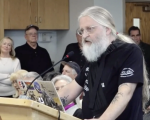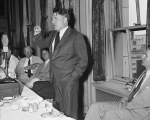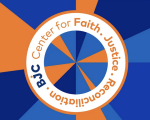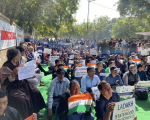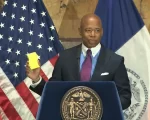News
Jesus Hates Cable News
In light of the growing controversy about Fox News, we are offering A Public Witness readers a piece originally published as the cover story of Word&Way magazine in October 2021 but which has never been published online.
In North Idaho, Religious and Secular Activists Work to Fight Christian Nationalism
Devotees of far-right politics have flocked to this part of Idaho and the surrounding states for decades, and for as long they have met resistance — including from faith leaders.
Old-School Christian Nationalism’s Avatar of Racism, Antisemitism, and Conspiracies
The early version of Christian nationalism turned the fear of communism into an excuse to embrace prejudice and forfeit American democracy. While Rev. Gerald L.K. Smith’s name is mostly forgotten, his ideas — and the strategies he used to promote them — still haunt America today.
Technical Foul for Biblical Interpretation
This issue of A Public Witness will coach you up about a recent controversy regarding women in ministry at Saddleback Church and then consider how moments like that are connected to the same way of reading the Bible that got the whistle blown at Texas Tech's Mark Adams.
Review: The Desert of Compassion
In "The Desert of Compassion: Devotions for the Lenten Journey" author Rachel M. Srubas draws on the images of the desert, which she knows so well as a pastor in southern Arizona, to provide the reader/spiritual seeker with a rich devotional book.
Baptist Joint Committee Gains Faith and Justice Center, Grows Religious Liberty Work
The Baptist Joint Committee for Religious Liberty is acquiring the Center for Faith, Justice, and Reconciliation in a move its leaders say will help them broaden efforts to support a more universal range of religious freedoms in the country.
In Remote Himalayan Desert, Buddhists, Muslims, Christians Unite to Protect Land, Heritage
Currently governed by India, the union territory of Ladakh in the larger Kashmir region has been a major point of dispute among India, Pakistan, and China since 1947.
For Many Congregations, Wiping Out Medical Debt Has Become a Popular Calling
Helping ease medical debt, especially for people of color, is an increasingly popular social justice project among liberal Christian, Jewish, and Muslim congregations. Over the past few years some 800 U.S. congregations have partnered with RIP Medical Debt to do so.
Review: The Book of Nature
Barbara Mahany's "The Book of Nature: The Astonishing Beauty of God’s First Sacred Text" serves to remind us that before there was scripture, there was nature. It was nature that spoke to humanity about the presence of God the creator.
When Prayer Isn’t the Answer
This issue of A Public Witness looks at the reinvigorated crusade by politicians across the country to push official, government prayer in schools. And then this class session ends with an explanation of why a common remark about gun violence in schools is dead wrong.


